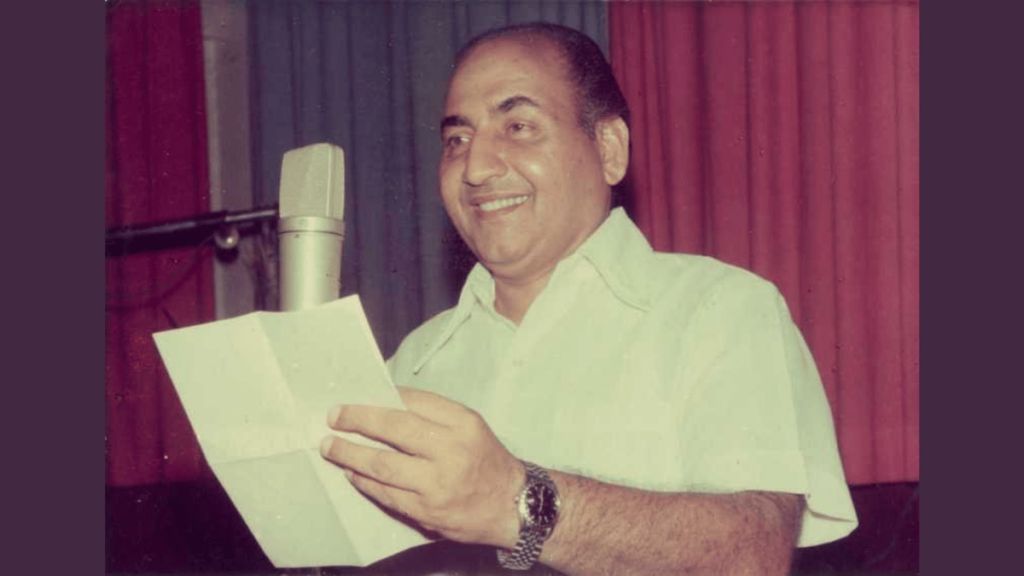
To talk about legendary playback singer Mohammed Rafi whose 100th birth anniversary falls on December 24, is like “Kahan se chhedoon fasana, kahaan tamaam karoon?” (Where to start it from and where to end it). Not just a rich cornucopia of more than 7,000 songs in his close to 40 years as a playback singer, his persona endeared him to all, too.
Though we tend to use adjectives and superlatives such as genius and legend rather loosely, Rafi is someone for whom all superlatives fall woefully short. The saying that humility is the hallmark of a great person is true to the last syllable about Rafi. He was an extremely kind-hearted singer who never condescended to or hurt anyone. Yours truly interviewed the famous composer Ravi Shankar Sharma (popularly known as Ravi) who said that while Rafi would observe the hero or character’s demeanour before singing for him, he never pontificated if the hero or character was rather unknown or new.
In 1963, Rafi sang for Vijay Kumar (Wahiduddin Qazi or Waheed) in the movie Kaun Apna, Kaun Paraya, which was a promotional movie for Waheed, younger brother of Johnny Walker. Rafi was very close to Johnny Walker. He didn’t take a penny for the movie and immortalised the song, Zara sun haseena-e-naazneen, composed by Ravi.
The same quality was extolled by the late Chandrashekhar Vaidya when I met him in Mumbai, who said that Rafi took a paltry amount for his maiden film, Cha Cha Cha, and immortalised all the songs that were filmed on Chandrashekhar Vaidya as he also acted in the film opposite Helen. Who can forget the songs like Subha na aayee shaam na aayee, Woh hum na thay woh tum na thay or Ik chameli ke mandve tale (with Asha Bhosle) from Cha Cha Cha?
Muhammad Zahoor Khayyam Hashmi (better known as Khayyam) was also of the view that Rafi was modesty personified. “Insaan ki shakl mein ek farishta thay Rafi sahab” (Rafi sahab was an angel in the garb of a human) he told me when I met him a couple of times.

Rafi was devoid of airs and attitude and was very easy to work with. He always attributed his success to God and people’s boundless love for him. Well-known Mumbai-based dental surgeon Dr Navroze Kotwal, whose father was a producer, met Rafi a number of times. He says whenever he expressed admiration for Rafi, the singer would point heavenwards and say, “Because of Him.” So unassuming!
His fellow singer Manna Dey was awestruck by Rafi’s uncanny ability to understand the essence of a song and sing it just the way a lyricist, composer, director and producer wanted it to be sung. That’s why he could sing a wide spectrum of songs emoting a gamut of emotions. Singing was not just his profession; it was his passion. When passion becomes profession and vice versa, the outcome has to be outstanding.
Even in the relative lull of the early 1970s when Kishore Kumar was the rage and craze, Rafi’s dedication never waned. Remember the otherwise humdrum numbers like Teri galiyon mein na rakhenge qadam (Film: Hawas, 1974) and Apni aankhon mein basa kar koi iqraar karoon (Film: Thokar, 1974)... Rafi sang both the songs so beautifully that they are still popular.
Sawan Kumar Tak’s plain rhyming in Teri galiyon mein na rakhenge qadam and Sajan Dehlvi’s rather ordinary Apni aankhon mein basa kar became all-time favourite numbers. That was Rafi’s magic, nay Midas Touch. Even a song like Sar jo tera chakraye became a rage because of the way Rafi rendered it in his inimitable manner.
Dilip Kumar used to say, “Ek fankaar ke liye acchha insaan hona naguzeer hai” (A creative person has to be a good human). And Rafi was undoubtedly a good human. Look at his photographs. His beatific smile in all the pictures gladdens the hearts and minds of his innumerable fans, admirers and connoisseurs.
Rafi was not just a singer. He was and still is a phenomenon, and shall remain so till the end of human civilisation.
(Sumit Paul is a regular contributor to the world’s premier publications and portals in several languages)